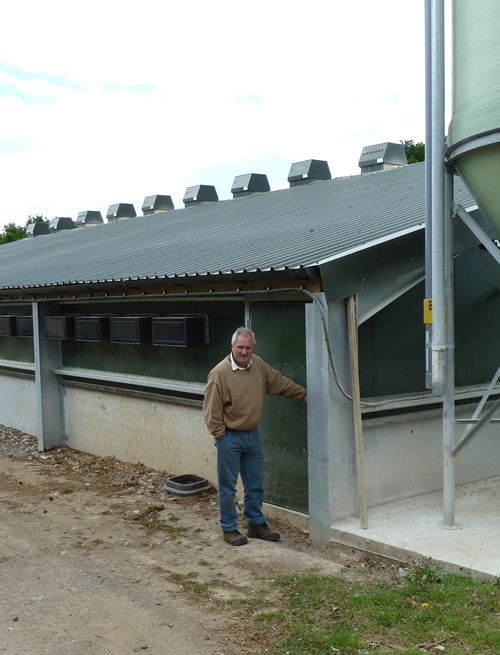
A brand new pullet rearing house is demonstrating how technology is an increasing ally to the modern poultry farmer, with an automated environment management system from Hydor a central feature in the Dorset based business.
Stuart Casely is a third generation farmer and a graduate of Plumpton College. His new rearing house recently produced its first batch of pullets and the recipient was so impressed with the quality of the flock that Stuart now has orders for a further four flocks.
The new building is house number nine in an established pullet rearing enterprise that forms part of a 400 acre tenant farm near Sherborne in Dorset. Other enterprises include 200 acres of cereals and 300 beef cattle. Stuart comments - ’Our mixed farm approach ensures that all the enterprises integrate well; the poultry manure is particularly valuable to our cereal enterprise for example.’
Plans for the new building started a year ago when Stuart approached Hydor at the 2010 Pig and Poultry Fair at Stoneleigh and were the result of a growing demand for floor reared pullets for higher welfare production systems. Stuart said - ’I wanted to use local contractors to work together on the project as I was keen to include some fresh ideas into the new building. Hydor’s wide range of advanced technology was especially attractive.’
Hydor provided the complete ventilation system, including Agri-Jet fan units and TPI inlets, both equipped with high efficiency light filters to give excellent control of the internal house lighting. Precision controlled inlets, linked to a Rotem Platinum computer, enables precise environment management and allows full
dawn-to-dusk lighting control to manage bird development closely, whilst the integrated weighing system allows precise control of bird weights. An example of Stuart’s fresh approach to pullet rearing was the use of LED rope lighting attached to the drinkers. Hydor were keen to get involved in providing the lighting system which encourages water intake to help improve the early brooding of the chicks.
The first flock of pullets is now in-lay and Stuart comments; ’Feedback from the farmer indicates that the birds are much more active and have settled into their new housing very well. I think the dawn-to-dusk lighting and slatted perch areas trained the birds well during the rearing phase.’
Stuart is convinced that his capital investment is helping him to achieve long-term financial security for his business - ’Pullet rearing is a relatively small industry and during difficult times quality will always be in demand’ says Stuart. ’The long-term commitment of my customer is testament to this’ he added. Stuart plans to progress using the quality of his product to create on-going demand. ’Good hens come from good pullets’ says Stuart, ’’minimising stress during rearing is critical to success. We have good quality housing and the farm is managed by a close-knit team of long-term employees. These are the things that create a successful business’.
The farm also performs an important educational role, Stuart manages a programme of educational activity known as Gore Farm Education Visits with a view to providing the next generation of consumers with a greater knowledge of how their food is produced.
Annually up to 2,500 children of all ages have visited the farm. ’We show children the farming operations right though the year, not just in the summer, so they get a genuine idea of what farming is. We don’t hide the contentious issues; we want them to understand why chemicals are used on crops and what the pros and cons of such activities are.’
Part of the house design included a full width viewing room on the end of the house to allow large numbers of children to view the birds without causing undue stress.
’This added considerably to the build cost but I was determined to include it’ said Stuart, ’’these children are the consumers of the future and if we want our industry to have a long-term future it is vital to have them on our side. Many of the restrictions we face today are as a result of the public losing touch with farming and we need to redress that.’
